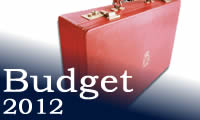 Go to main content
Go to main content
Archive Website of the UK government
Please note that this website has a UK government accesskeys system.
Main menu

What is the Budget?
The Budget statement is the Chancellor's yearly update on the state of the economy, public finances and progress on the government's economic goals. Changes to tax rates and announcements on how taxpayers' money will be spent are also made in the Budget statement. Find out what sort of things are announced in the Budget and how it affects you.
The Budget process
Tax and duty
The government raises money through taxes such as Income Tax and VAT, and duty on things like:
- alcohol
- tobacco
- fuel
- property
The government may decide to raise or lower these depending on the economic and financial situation.
Any changes to taxes or duties will normally be announced in the Budget.
The Budget may also confirm changes to tax bands, allowances and National Insurance rates.
Government spending
As well as outlining how the government will raise money through taxation, the Budget also details how the government will spend that money.
For example, the government may decide to increase or reduce the amount of money spent on things like benefits, social housing, defence and state pensions.
Other announcements often made in the Budget include how the government plans to encourage economic growth, create jobs or protect the environment.
Budget Day
The Chancellor of the Exchequer delivers the Budget in a speech to the House of Commons.
The Budget speech
The Chancellor's speech usually has two parts:
- a summary of the economic situation
- a more detailed account of specific measures the government has or plans to introduce to raise money to pay for public services
It’s usually in this second part that tax changes that affect your income and spending are announced.
After the Chancellor's Budget speech, the Leader of the Opposition, rather than the Shadow Chancellor replies. The Shadow Chancellor makes his response the day afterwards, giving him a day to analyse the details of the budget before making a considered response.
The length of the Budget speech can vary. The longest continuous Budget speech was by William Gladstone on 18 April 1853, lasting four hours and 45 minutes. Benjamin Disraeli's 1867 Budget speech lasted only 45 minutes, about the same time as Gordon Brown's in 2005.
The Budget debate
Budget changes can start before the annual Finance Bill is passed
There are then usually four or five days of debate on the 'Budget resolutions'. These are the basic parts of the Budget that renew annual taxes, such as Income Tax or Corporation Tax. The debate covers different policy areas such as health, education and defence.
Budget resolutions
One of the key features of tax law is that changes announced in the Budget can take effect before the Finance Bill is passed.
The Budget resolutions are set out as soon as the Chancellor has finished the Budget speech. They are voted on in the House of Commons at the end of the Budget debate and if passed, they can take effect straight away. They authorise the setting of certain taxes or changes in their rates under the Provisional Collection of Taxes Act 1968.
Budget rules mean that the changes on excise duties, for example, taxes on alcohol and petrol, often take effect from 6.00 pm on Budget Day.
Finance Bill
The Finance Bill is the Bill presented to Parliament each year which enacts the Chancellor of the Exchequer's Budget proposals for taxation.
Once the House of Commons has agreed the Budget resolutions, the Bill starts its passage through Parliament in the same way as any other Bill.
- HM Treasury on Twitter
- Budget 2012 on HM Treasury
- Budget 2012 on HMRC
- Budget 2012 on Business Link


